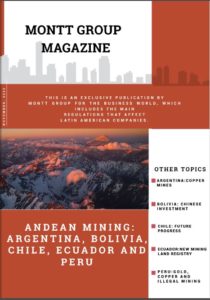
Montt Group Legal Bulletin
Central Andean Mining Breaking News
Peru: ICSID AWARD: LUPAKA GOLD CORP. VS. REPUBLIC OF PERU
Publication Date: November 1st, 2025
ICSID AWARD: LUPAKA GOLD CORP. VS. REPUBLIC OF PERU
Analysis of the Indirect Expropriation of a Mining Project Due to State Inaction
Over the past decades, Peru has emerged as one of the world’s most attractive destinations for mining investment. This is largely due to its vast reserves of copper, gold, silver, and zinc, which keep the country among the top global producers of metallic minerals. This geological potential, combined with pro-investment economic policies, has positioned Peru as a key destination for foreign capital—particularly from Canada.
However, the coexistence between mining operations and local communities — peasant, native, and Indigenous peoples — continues to pose significant challenges for the sustainable development of the sector. Social tensions, overlapping land rights, and the State’s limited capacity to manage these conflicts continue to affect the continuity of multiple operations.
A paradigmatic example is the international arbitration between Lupaka Gold Corp., a Canadian company, and the Republic of Peru, resolved by the International Centre for Settlement of Investment Disputes (ICSID), which held the Peruvian State liable for indirect expropriation and ordered it to pay substantial compensation.
1. Origin of the Dispute
The dispute arises from the Invicta Project, located in the province of Huaura, approximately 120 kilometers north of Lima. The operation was managed by Invicta Mining Corp. S.A.C., a Peruvian subsidiary of Lupaka Gold Corp., responsible for financing and technical operations.
The company had executed cooperation agreements with the Lacsanga Peasant Community, whose lands were traversed by the access road to the mine, constructed and financed by the mining company. However, in October 2018, the Parán Peasant Community, which claimed rights over part of the territory and roadway, blocked access to the project, preventing entry of both company personnel and State officials who were to authorize the commencement of operations.
Despite the mediation efforts of the Peruvian authorities, the conflict remained unresolved, and the company lost control over its facilities. Lupaka Gold Corp. argued that the State’s failure to act, despite being fully aware of the situation, violated its right to protection and security under the Canada–Peru Free Trade Agreement (FTA) and effectively destroyed the economic value of its investment.
2. Loss of the Project and Financial Consequences
The blockade triggered a chain reaction. Lupaka Gold Corp. had financed the development of the project through a loan secured by the project’s own assets, to be repaid from future production revenues. The prolonged suspension of activities made it impossible to generate cash flow, resulting in default on financial obligations.
In August 2019, after ten months of inactivity, the lender foreclosed on the collateral, and Lupaka Gold Corp. permanently lost control of the Invicta Project.
3. The ICSID Arbitration
In October 2020, Lupaka Gold Corp. filed a request for arbitration against the Republic of Peru before ICSID, alleging violations of the Canada–Peru FTA. The company claimed that the State:
- allowed an indirect expropriation of its investment;
- breached the fair and equitable treatment (FET) standard by failing to ensure a stable and predictable environment; and
- neglected its duty of protection and security, by not taking reasonable measures to restore order.
Peru countered that the peasant communities are autonomous entities recognized by the Constitution, acting independently from the central government, and that authorities prioritized dialogue to prevent escalation of the conflict.
4. Tribunal’s Decision and Compensation
After examining the arguments in ICSID Case No. ARB/20/46, the Arbitral Tribunal concluded that, although the acts of the Parán Peasant Community were not directly attributable to the State, Peru incurred international responsibility by omission, for failing to exercise due diligence in protecting a foreign investment from a known risk.
The award determined that Peru indirectly expropriated the investment, as the company was deprived of the control, use, and economic value of its project. It further found that the State breached both the fair and equitable treatment and full protection and security standards by failing to ensure adequate operating conditions.
On June 30, 2025, ICSID ordered the Republic of Peru to pay Lupaka Gold Corp. USD 40.4 million in compensation, plus USD 4.2 million for costs and arbitration expenses. Both amounts accrue compound interest at 9% per annum (UST + 5%) until full payment.
According to updated estimates and public company reports, the total amount owed exceeds USD 67 million as of October 28, 2025, the date on which the 120-day deadline for Peru to seek annulment expired. The State did not file any request for annulment; thus, the ICSID award became final and binding.
5. Final Considerations
The Lupaka Gold Corp. vs. Republic of Peru case sets a significant precedent in international arbitration concerning extractive industries. The award reaffirms that State inaction in the face of social conflict may have effects equivalent to direct expropriation, thereby generating international responsibility and the obligation to compensate the investor.
It also underscores the need to strengthen the State’s institutional capacity for social conflict management in the mining sector, in order to prevent local disputes from escalating to international forums with substantial economic repercussions.
6. Outlook for Mining Investment in Peru
Despite recent challenges involving international arbitration, Peru remains a strong destination for mining investment. Through the Ministry of Energy and Mines, the government continues to promote policies aimed at ensuring operational continuity, attracting new investments, and reinforcing legal stability within the sector.
The national mining portfolio currently includes 67 investment projects totaling over USD 64 billion, along with 84 exploration projects valued at approximately USD 1 billion.





